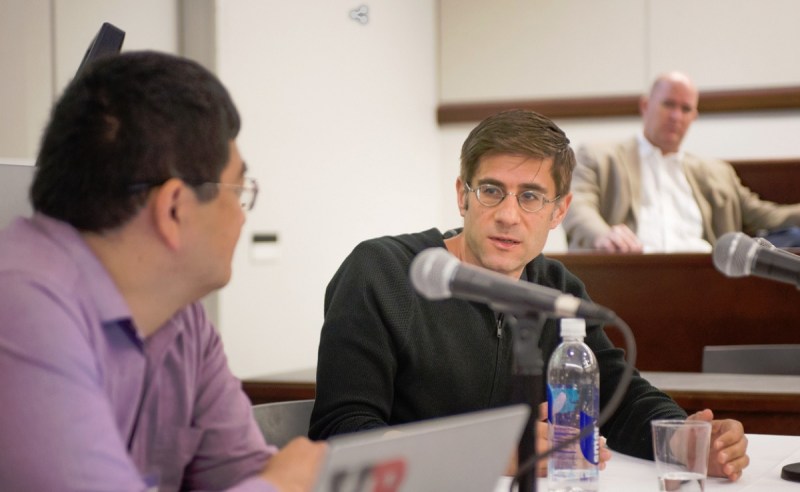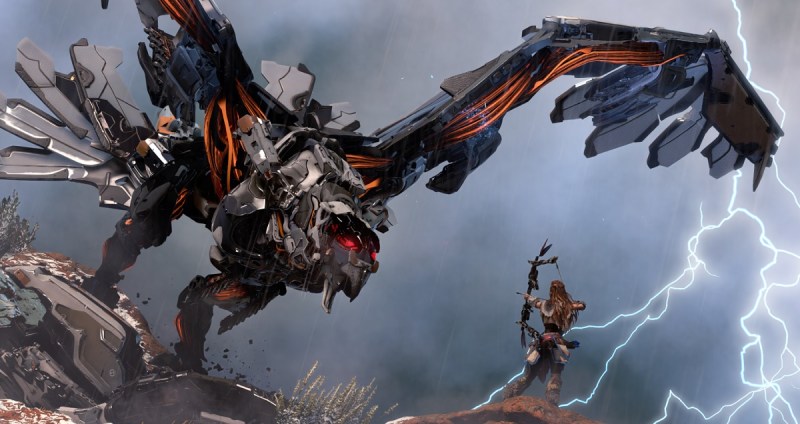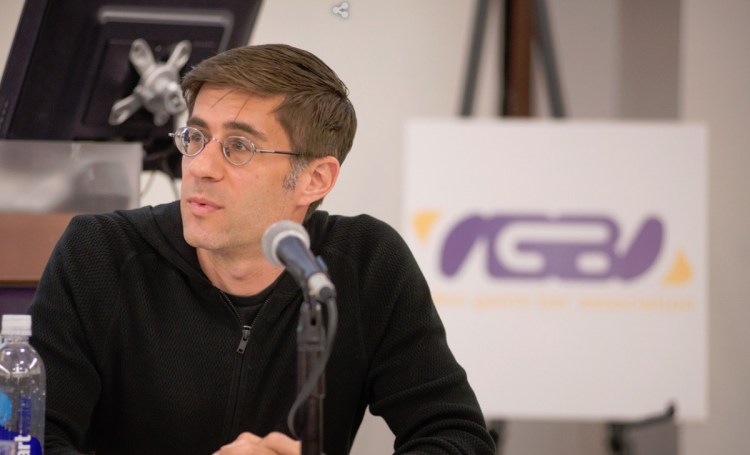testsetset
I’ve formed a lot of opinions about the game industry over the years. And I recently got the chance to spout them in a conversation with Steve Goldstein, president of Turtle Rock Studios, the maker of the Evolve video game published by Take-Two Interactive’s 2K label in February 2015.
At UCLA, we gave a talk before a group of game industry lawyers from the Video Game Bar Association. We were encouraged to talk about the whole industry’s trends, and we started by noting how conservative the console game industry has become, with huge budgets that are forcing publishers to be very careful when it comes to launching original games. Sequels rule, and that’s a sad reality.
We also talked about the cycles that favor the creation of new kinds of games and platforms, as well as the cycles where big game companies either retrench or expand their investments in games. Joseph Olin, executive director of the Video Game Bar Association, peppered us with questions toward the end.
Here’s an edited transcript of our conversation.

Above: Dean Takahashi (left) of GamesBeat talks about the game industry with Steve Goldstein of Turtle Rock.
Steve Goldstein: For the past four years now, I’ve been the president and general manager at Turtle Rock Studios. We’re an 80-person developer. Our latest console release was Evolve, which came out in 2015. Prior to that, we created Left 4 Dead, which was a big hit a while ago.
Since that time, up until last year, we’ve been a one project studio. But starting in the tail end of 2016, we split the studio into two departments. One is focused on service-based games, and the other is focused on VR.
GamesBeat: When you’re looking a few years out and you’re going to make one bet on one big game that will take you a few years to make, how do you plan that? How do you decide what to target, what the market will be like, what the audience wants?
Goldstein: There isn’t an opportunity anymore, unfortunately, to try to guess what’s going to happen a few years out. The industry’s changed quite a bit when it comes to large-scale games. When you look at the console environment, that’s no longer a space for independent developers to work in. Our last game had an enormous budget, yet it’s competing with games that are internally developed by publishers, which have budgets that are anywhere from two to four times the amount that we spent.
That’s a problem in a couple of ways. One, publishers don’t want to make bets on new IP given the cost of development. Two, if they are going to make a new IP for console, they’re probably going to do it internally, just because they feel they can control those costs better. How many new, successful franchises have been created with the latest generation of consoles? Bloodborne?
GamesBeat: Nintendo’s Arms is coming soon.
Goldstein: Well, Nintendo is a separate issue. Their games don’t cost as much as development on PlayStation and Xbox.
GamesBeat: Horizon Zero Dawn.
Goldstein: It’s not a franchise yet, but I agree. That’s two. How long have the consoles been out? 2013? That’s not a good sign, guys. When you look at the state of the industry, if we can only name a few new franchises for this console generation, I don’t see how they continue.

Above: Aloy has guts in Horizon: Zero Dawn.
GamesBeat: There’s a trap for the industry, though. There’s no better way to squeeze innovation out of games than to leave behind this tent-pole strategy. Justin Bailey of Fig just did a talk at our GamesBeat Summit. He pointed out that there used to be a tent-pole strategy, where you had a big flagship game to make all the money and pay for your bets on everything else. EA in 2008 had 60 games. Last year, it had eight — all of them big bets and none of them [were] really experimental.
Goldstein: It doesn’t even have to be experimental. It’d just be nice if it was another IP, something that’s not going into the fifth or sixth iteration. Going back to what you asked earlier, how do we figure out what we want to do? We figure out what fun game we want to play, but we also look at the market and say, “Here’s a hole right here.” We start targeting that. But we don’t target boxed products anymore. We just won’t approach publishers with a concept where we say, “This’ll cost $60, and then, we’ll make another $50 worth of DLC.” It doesn’t make sense for us as a business to get into that space. There’s no benefit for an independent studio.
It’s unfortunate. I love consoles. I like making cool stuff and pushing the envelope. But it doesn’t make good fiscal sense anymore.
GamesBeat: There are still areas where there can be some innovation — like on the PC and mobile. Dead by Daylight is a brand new IP that came from Behaviour Interactive. It’s an online game about trying to escape from a serial killer. You have one killer and four victims.
Goldstein: Sounds familiar [laughs]. It’s a great example, actually. We put out Evolve with a similar concept, four versus one, but it was an enormous experience in a $60 box. We look at how Dead by Daylight got picked up. It had a $20 price point, cost $7 million to develop, and it’s a much smarter move for doing that kind of innovative stuff. It’s a small ask for the user to embrace it, and it’s also a small ask when it comes to development.
What I’ve seen in the market lately — the games business is more Dickensian than it’s ever been. It’s the worst of times for guys making big budget titles, but it’s the best of times for people who are able to put something out that cost them $5 million or less. What Justin’s doing is fantastic. I’ve also seen lately that the elusive “game fund” is starting to happen now. These funds are coalescing where they can put in [$1 million to] 2 million to see [if] an independent studio can develop something well.
But when that happens, all those companies are going to be PC focused. Console will be an afterthought for them.

